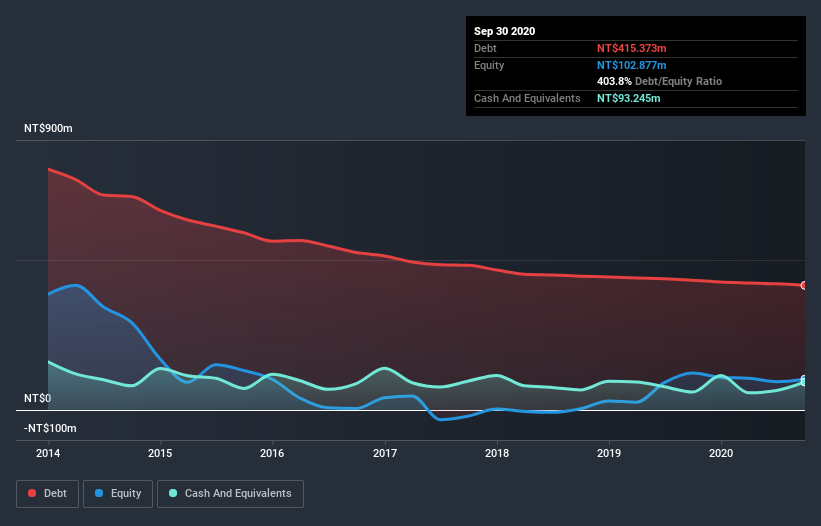Some say volatility, rather than debt, is the best way to think about risk as an investor, but Warren Buffett famously said that 'Volatility is far from synonymous with risk.' So it seems the smart money knows that debt - which is usually involved in bankruptcies - is a very important factor, when you assess how risky a company is. Importantly, Powercom Co., Ltd (TPE:3043) does carry debt. But is this debt a concern to shareholders?
What Risk Does Debt Bring?
Debt is a tool to help businesses grow, but if a business is incapable of paying off its lenders, then it exists at their mercy. Ultimately, if the company can't fulfill its legal obligations to repay debt, shareholders could walk away with nothing. However, a more common (but still painful) scenario is that it has to raise new equity capital at a low price, thus permanently diluting shareholders. Having said that, the most common situation is where a company manages its debt reasonably well - and to its own advantage. The first step when considering a company's debt levels is to consider its cash and debt together.
View our latest analysis for Powercom
What Is Powercom's Debt?
As you can see below, Powercom had NT$415.4m of debt, at September 2020, which is about the same as the year before. You can click the chart for greater detail. However, it does have NT$93.2m in cash offsetting this, leading to net debt of about NT$322.1m.

How Healthy Is Powercom's Balance Sheet?
We can see from the most recent balance sheet that Powercom had liabilities of NT$1.04b falling due within a year, and liabilities of NT$39.5m due beyond that. Offsetting these obligations, it had cash of NT$93.2m as well as receivables valued at NT$237.5m due within 12 months. So it has liabilities totalling NT$746.9m more than its cash and near-term receivables, combined.
This deficit is considerable relative to its market capitalization of NT$1.05b, so it does suggest shareholders should keep an eye on Powercom's use of debt. Should its lenders demand that it shore up the balance sheet, shareholders would likely face severe dilution. The balance sheet is clearly the area to focus on when you are analysing debt. But it is Powercom's earnings that will influence how the balance sheet holds up in the future. So if you're keen to discover more about its earnings, it might be worth checking out this graph of its long term earnings trend.
In the last year Powercom had a loss before interest and tax, and actually shrunk its revenue by 4.9%, to NT$1.1b. We would much prefer see growth.
Caveat Emptor
Importantly, Powercom had an earnings before interest and tax (EBIT) loss over the last year. Indeed, it lost NT$12m at the EBIT level. When we look at that and recall the liabilities on its balance sheet, relative to cash, it seems unwise to us for the company to have any debt. So we think its balance sheet is a little strained, though not beyond repair. For example, we would not want to see a repeat of last year's loss of NT$29m. So to be blunt we do think it is risky. When analysing debt levels, the balance sheet is the obvious place to start. However, not all investment risk resides within the balance sheet - far from it. Be aware that Powercom is showing 2 warning signs in our investment analysis , you should know about...
If you're interested in investing in businesses that can grow profits without the burden of debt, then check out this free list of growing businesses that have net cash on the balance sheet.
When trading Powercom or any other investment, use the platform considered by many to be the Professional's Gateway to the Worlds Market, Interactive Brokers. You get the lowest-cost* trading on stocks, options, futures, forex, bonds and funds worldwide from a single integrated account. Promoted
New: Manage All Your Stock Portfolios in One Place
We've created the ultimate portfolio companion for stock investors, and it's free.
• Connect an unlimited number of Portfolios and see your total in one currency
• Be alerted to new Warning Signs or Risks via email or mobile
• Track the Fair Value of your stocks
This article by Simply Wall St is general in nature. It does not constitute a recommendation to buy or sell any stock, and does not take account of your objectives, or your financial situation. We aim to bring you long-term focused analysis driven by fundamental data. Note that our analysis may not factor in the latest price-sensitive company announcements or qualitative material. Simply Wall St has no position in any stocks mentioned.
*Interactive Brokers Rated Lowest Cost Broker by StockBrokers.com Annual Online Review 2020
Have feedback on this article? Concerned about the content? Get in touch with us directly. Alternatively, email editorial-team (at) simplywallst.com.
About TWSE:3043
Powercom
Provides power solutions and peripherals in Taiwan and internationally.
Adequate balance sheet with questionable track record.
Similar Companies
Market Insights
Community Narratives




